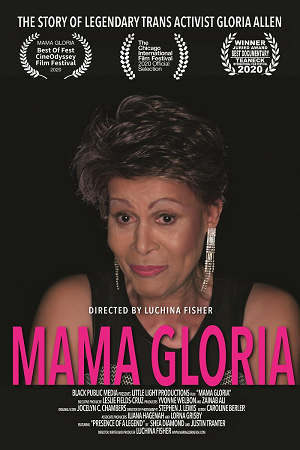
Mama Gloria 2020
Distributed by Third World Newsreel, 545 Eighth Avenue, Suite 550, New York, NY 10018; 212-947-9277
Produced by Yvonne Welbon and Zainab Ali
Directed by Luchina Fisher
Streaming, 76 mins (59-min version also available)
High School - General Adult
Biography; Transgenderism; Gay Liberation Movement
Date Entered: 06/02/2022
Reviewed by Shanna Hollich, Director, Guthrie Memorial Library - Hanover's Public LibraryLuchina Fisher’s Mama Gloria is a beautiful and inspiring tribute to Gloria Allen, a transgender woman born and raised in the mid-20th century on Chicago’s South Side. Gloria came of age during the legendary drag balls in the 1960s and 1970s and transitioned several years before Stonewall and the first Christopher Street Liberation Day March. For those who view gender questioning and flexibility as a “modern” phenomenon, Mama Gloria makes it clear that queer and trans people have lived, and thrived, far back into history.
The film closely follows Gloria’s life story and consists primarily of interviews with her and her friends and family. We see Gloria in her home, in her community, in the homes of her loved ones, going about her daily routines. It’s an intimate look at the life of an icon, and it’s powerful to watch Mama Gloria, age 75 at the time of the film’s production/release, reflect on the adversity she faced over the years and her courage in boldly living the life she always knew she was intended for. The filmmakers pull no punches here, and we see Gloria tearfully recount incidents of severe bullying, domestic abuse, and sexual violence. However, there is a tremendous amount of love evident in this story as well. Gloria’s mother was a showgirl and model, and her grandmother was a seamstress and costume designer for drag queens and male strippers, which means Gloria was blessed with strong family support during a time when many queer and trans folks were forced to live double lives, to hide who they were, and to struggle with feelings of intense shame. We see Gloria with her cousins, who have seemingly accepted her and supported her since childhood, and we follow her to a high school reunion, where friends and classmates show encouragement and pride at her ability to live her truth.
This film is highly recommended. It paints an especially evocative picture of the history of LGBTQ+ issues by following the story of someone who lived through it, and it portrays a realistic and inspiring image of the potential for joy amidst hardship and struggle. Trans women of color in particular are far more likely to be targeted for hate crimes and are murdered at alarmingly high rates, a statistic that Gloria is painfully aware of. With that in mind, it’s especially important for trans and queer youth to see an example of a strong trans woman aging with dignity and grace, to prove that it’s possible to survive. This film would be a natural fit across multiple disciplines, including African American or Black Studies, Gender or Trans or LGBTQ+ Studies, Women’s Studies, and Sociology. It would also make an excellent addition to courses or programs looking to expand the general LGBTQ+ knowledge of their communities. The film is engaging to watch and accessible to a wide variety of audiences, which makes it appropriate for viewing in LGTBQ+ club meetings, Pride events, or educational programs for the public.
Awards:Best Documentary, Teaneck International Film Festival 2020; Jury Winner, MKE Film Festival 2021; Best of Fest, CineOdyssey Film Festival 2020; 2022 GLAAD Media Award Nominee for Outstanding TV Journalism – Long-form; Black Lens Award, Milwaukee Film Festival 2021; Nominated for Gold Q-Hugo Award and Best Documentary Feature, Chicago International Film Festival; Finalist, Holidays 365 International Film Festival
Published and licensed under the Creative Commons Attribution 4.0 license. Anyone can use these reviews, so long as they comply with the terms of the license.